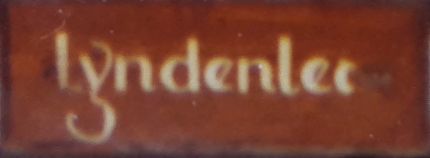About Lyndenlea
Lyndenlea was the name of the house in which I grew up and lived for more than 37 years until July 2022. Situated in Mangotsfield, a village in Gloucestershire, England on the eastern outskirts of Bristol, it was built in 1954 and was owned by my family from 1964. Although the painted wooden sign bearing the name (pictured below) was taken down from above the front door sometime in the early 1980's and is now lost, the name continued to be used by a few distant friends and relatives on cards and letters, and in addition to adopting it as my online "brand" I have carried it forward to my new home in the nearby Gloucestershire town of Yate. This house was built in 1965 when the previous owner purchased it new from the developer, who in turn had purchased the land two years earlier from the local District Council.
 About a century before either house was built, in the 1850's Dorset poet William Barnes wrote
My Orcha'd in Lindèn Lea. I've written more here about The Poem, the song that followed, and
its extremely tenuous connection to the house in Mangotsfield.
About a century before either house was built, in the 1850's Dorset poet William Barnes wrote
My Orcha'd in Lindèn Lea. I've written more here about The Poem, the song that followed, and
its extremely tenuous connection to the house in Mangotsfield.
Etymology
The name "Lyndenlea" has its origins in Middle English, a form of the English language that was spoken after the Norman Conquest of 1066 until the late 15th Century. Lynden or linden refers to the wood of the lime tree (genus Tilia, unrelated to the citrus lime), similar to how oaken refers to the wood of the oak tree; and lea is a clearing in a forest or open ground.
The first owners (from 1954 to 1964) of the house in Mangotsfield gave it this name, although there isn't an obvious reason why they might have done so – the area was open fields before it was developed for housing in the 1950's, and while the village was originally in the middle of the "King's Wood" (a royal hunting estate that surrounded Bristol and was finally cleared for coal mining in the 18th Century), it's unlikely that a long-gone limewood clearing would have been remembered around 200 years later.
The most likely explanation is that they simply liked the name. Perhaps they brought it from their previous home, as indeed I have done myself.
 Skip to:
Skip to: